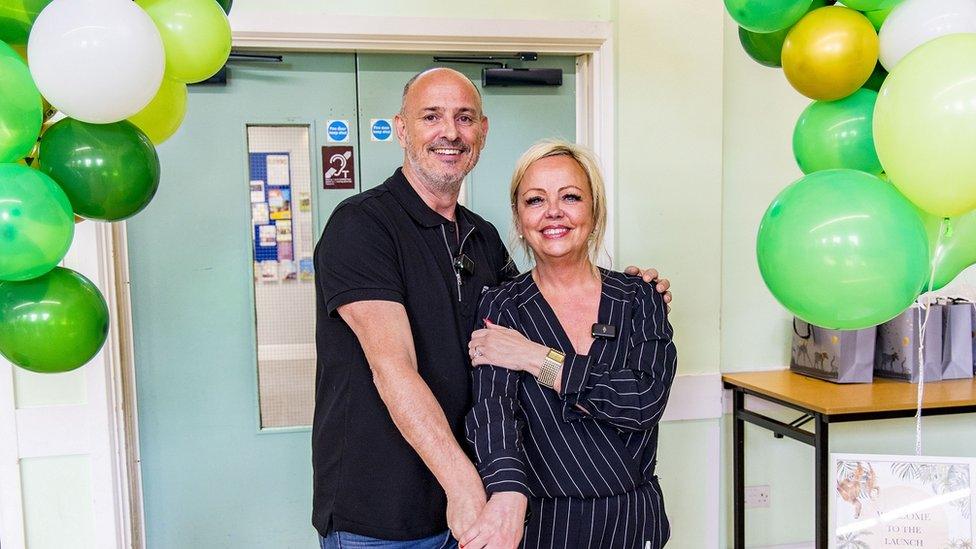Council costs warning as fostering places fall
- Published

In the year ending March 2023, applications from prospective fostering households were down 18% compared to 2019
A drop in fostering places means councils are wasting "an incredible amount of money", a carers' organisation has warned.
New Ofsted data shows falls of 11% in local authority foster carer households and 8% in mainstream fostering places since 2019.
Low capacity can lead councils to place children in more expensive residential homes, sector bodies say.
The government said it was investing £27m in fostering place availability.
Official statistics published by Ofsted show that, as of 31 March, there were 72,770 approved mainstream fostering places in England. That is down 8% from the same date in 2019.
The drop has been driven by an 11% decrease in the number of mainstream local authority households, down to 19,835.
'Missed opportunity'
Jane Collins, chief executive officer of membership organisation Foster Support, said: "As they fail to retain foster carers, financially [local authorities] waste an incredible amount of money, but in addition they lose all that experience and training."
The number of independent fostering agency households has risen by less than 1% since 2019 to 15,170.
At the same time, 'family and friends' households - sometimes known as 'kinship foster care' - have risen from 6,930 to 8,400.
The Children's Commissioner, Dame Rachel de Souza, said she was frustrated support for kinship carers and foster carers was not a greater priority for the government.
She said: "The King's Speech was a missed opportunity. I want to see all political parties stepping up to support these children, our children, and the absolute heroes - kinship carers, foster carers, who want to take these children into their home."

'An injustice'
Foster carer Jay, not his real name, has twice been the subject of false allegations made to North East Lincolnshire Council. He told the BBC he believes the "distinct lack of regulation around how foster carers are treated" has added to the difficulties in retention.
In both cases, no wrongdoing was found. His own subsequent complaints to the Local Government and Social Care Ombudsman were upheld, with the local authority ordered to pay compensation.
The ombudsman found the council's investigation into the second allegation was mishandled and described the uncertainty faced by Jay and his partner as "an injustice".
Jay said: "When you know you're trying to do the best for these kids, and you know you've done nothing wrong, it's so frustrating.
"We should have been able to go to an employment tribunal to say we are being mistreated."
A North East Lincolnshire Council spokesperson said it had accepted all the ombudsman's recommendations, including the compensation.
They said the authority was working with organisations and partners - including the ombudsman - to ensure it "listens, learns and responds" as it continues to improve its children's services.
Jay still fosters, but in a different council area.

System pressures
Over the summer, the BBC contacted every council with fostering responsibility to see if they were actively recruiting foster carers. Of those that responded, 98% said they were.
The charity Now Foster wants to see more people encouraged to foster once in their lives, rather than it being viewed as a permanent job.
Its chief executive officer, Sara Fernandez, said: "If we had many many more foster carers, those foster carers already in the system should be under less pressure."
Council offers benefits to foster carers
Couple says fostering is a joyful rollercoaster
'Why I decided to stop being a foster carer'
Nigel Minns, who chairs the ADCS Health, Care and Additional Needs Policy Committee, said the latest statistics highlighted the urgent need for recruitment.
He said when a suitable foster family cannot be found in-house, local authorities often use independent fostering agencies.
"The high cost of these placements places pressure on severely-stretched council finances," he said. "The government must address this."
A Department for Education spokesperson said every child deserves a "safe and secure home", which councils had a responsibility to provide for all those in their care.
They said action being taken to support foster carers included raising financial allowances and reducing tax rates.
"We are also investing £27m to deliver a fostering recruitment and retention programme so foster care is available for more children," they added.
Related topics
- Published30 October 2023

- Published2 October 2023

- Published5 August 2023

- Published25 May 2023
